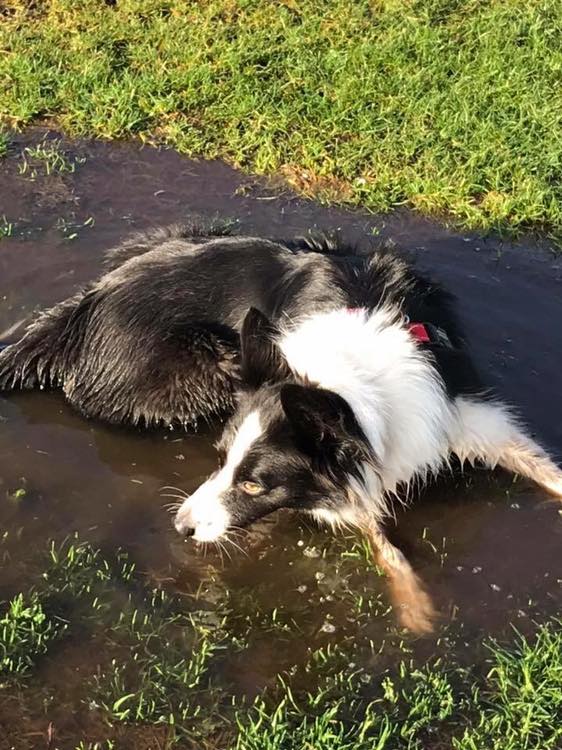
Why dogs love jumping and rolling around in mud
When we take our dogs out for a walk, whether it’s in the park or across the fields, they seem to love jumping and rolling around in the mud. They normally spot the mud before you and think “yay mud!” and are off! You’re left wondering why oh why do dogs love to roll around in the mud?
I thought I’d share the reasons why to help understanding and share tips to try and reduce some of this behaviour, or avoid the smell lingering back at home.
The reasons dogs love to roll around in the mud
Rolling around in mud is a behaviour that dogs do not share with human beings! For this reason dog owners don’t understand it and many get frustrated by it. The extra time and mess of a bath when they get back is enough for any dog owner to say “no” when the dog heads for the mud.
When I have time I really enjoy watching their pleasure of jumping in the mud (mine’s a jumper not a roller). But when I’m in a rush then I do try and stop it. I feel punishing your dog for this behaviour is like cutting them off from their wild side and natural instincts, so I have tried to manage this through training.

-
Hunting instinct
Like we said, dogs retain some aspects and behaviours from their wild ancestors. Like wolves (their closest relatives), dogs need to camouflage themselves when they’re hunting prey. So one thing they do is cover up their own scent, which can involve smearing themselves with mud, foul-smelling substances or even dead animals. Hence the rolling in fox poo we all hate! -
Territorial nature
When your dog rolls around in prey, they leave a unique smell on their back or legs. This is how your dog expresses their happiness for having found the prey before other dogs. When other dogs eventually find the prey, they’ll know who it belongs to when they smell your dog on it.
Dogs have hundreds odour producing glands on their bodies and it’s easy for them to leave their scent on things. It’s also a way they communicate with the other members of their pack about what they found. -
Maintain their unique doggie smell
People make their dogs’ lives more difficult by bathing them with perfumed soap (even if products are suitable for animals). Smells that are ‘dirty’ and ‘gross’ for humans are really a dog’s unique scent.
Dogs communicate with other dogs using their scent, even though it may be unpleasant for humans who must share a house with them. And if we think that dogs like bubble baths… we are wrong! If it were up to dogs, they would rather roll in fox poo any day, than take a bath and remove their unique scent. -
Enjoy the smell
Although it’s hard for us to understand, dogs love to roll in mud and dead animals. A dog’s sense of smell is not the same as ours. In fact, it’s much better. Poo may be more pleasing to your dog than a fancy perfume! -
Spreading information
Another one inherited from dogs’ closest cousins, the wild wolves, is spreading of information. According to a study, when a wolf in a pack finds something that catches his attention, he first sniffs the prey and then covers himself with its scent. The wolf then transfers the smell to the rest of the pack, so they can decide whether to eat the prey. Sound familiar if you’ve more than one dog? -
Showing superiority
This allows your dog to demonstrate to the pack that they have caught something interesting, and therefore deserves praise. Now though, your dog will be reprimanded and therefore confused, since the smell after a dog has rolled around in the mud or on prey can be unbearable.

It’s hard not to tell them off, but next time consider all of these points.
What can we do to keep our dogs from rolling around in the dirt?
First, you don’t have to tell your dog off, because if your dog does it, it’s a purely instinctual behaviour. What you can do, however, is to avoid encouraging the behaviour. If you laugh when they do it, or make excitable noises, they will take this as agreement and praise.
If you take your dog out for a walk and you see that he’s rubbing against something dirty, firmly tell him, “No,” and remove him. You’ll need a lot of patience because your dog may not understand your command the first time you give it. But be consistent with this reaction.
If your dog usually does it in the garden, the fix could be as simple as picking up your dog’s droppings more often or making sure that there’s no litter, dead animals or anything else that would catch his attention. This can be checked before letting your dog free in the garden.
Secondly you can pop a coat onto your dog. Those that cover the underbelly are great for the “jumpers in mud” but if your dog rolls, any style coat will do. At the end of a walk the coat is easy to pop in to wash and your dog doesn’t stick the house out!

If I am in a rush after the dog walk to go out, I make sure I use a coat that covers their underbelly as well as their back so it’s quick on the return from the walk.
And invest in some great cleaning towels if you've one that loves the mud! They do save a lot of time....and smell! You can read more here on drying and cleaning your dog after a muddy dog walk too.

